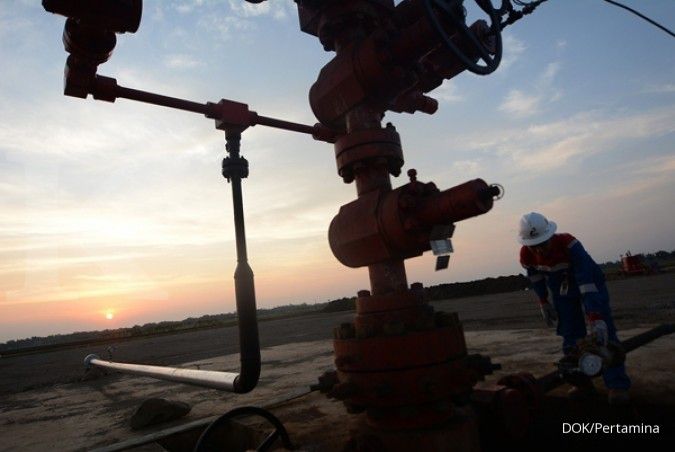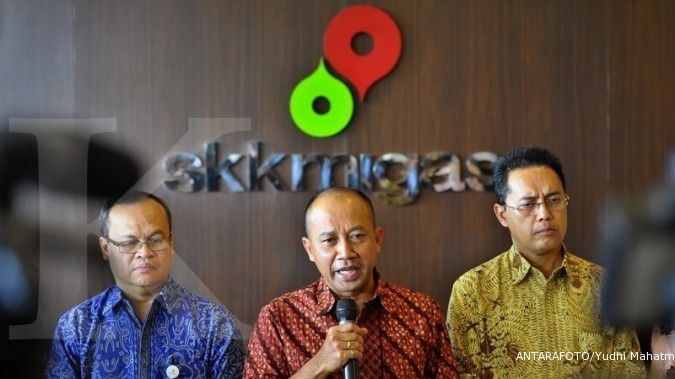JAKARTA. Energy and Mineral Resources Minister Sudirman Said fired Edy Hermantoro, the ministry’s director general of oil and gas, on Tuesday amid a continued drop in the country’s oil and gas production.
The newly appointed minister said that the removal of the oil and gas chief was part of his campaign to reinforce the oil and gas office, which had failed to meet the people’s expectations in managing the country’s oil and gas sector in recent years.
Sudirman said he decided to replace Edy after receiving a report from the Presidential Working Unit for the Supervision and Management of Development (UKP4) that many important projects conducted by the oil and gas office could not be carried out as expected.
“The UKP4 reports that among all national-development programs, the oil and gas sector got a red mark as many projects have stalled,” Sudirman said.
Naryanto Wagimin, the director for upstream oil and gas at the directorate general, will be appointed as the acting chief of the oil and gas office.
Sudirman, the co-founder of the Indonesian Transparency Society (MTI), who was sworn in as minister last week, had earlier vowed that he would reorganize the bureaucracy in all first-echelon offices within the ministry in order to remove the bottlenecks in the oil and gas programs.
The energy and mining sector has been under the spotlight particularly after the Corruption Eradication Commission (KPK) named the previous minister a suspect and arrested the head of the upstream oil and gas regulatory agency, SKKMigas. Many big and significant projects are also stalled due to various reasons, including delays in permit issuances.
Among delayed projects are the development of the Banyu Urip field in the Cepu block, the Indonesia Deepwater Development (IDD) and the development of the Marsela block.
The projects are seen as essential to the country’s oil and gas industry. Indonesia, a former member of OPEC, is struggling to avoid further plunges in its oil output by conducting more exploration to secure new hydrocarbon sources. Most of Indonesia’s existing oil fields are old and have been depleted due to over-exploitation.
In this year’s state budget, oil output has been forecast at 818,000 barrels of oil per day (bopd). However, realization to date remains below expectations.
SKKMigas secretary Gde Pradnyana said oil output stood at 791,482 bopd as of the end of October. “The low realization is partly caused by planned and unplanned shutdowns,” Gde said.
Unplanned shutdowns have caused losses of 18,400 bopd to date while planned shutdowns contributed to losses of 8,500 bopd.
SKKMigas acting chief Johannes Widjonarko estimated that oil output would amount to only 794,000 bopd by the year-end.
Given the low realization, the government will likely miss the target for the oil and gas sector contribution to state revenues. The declining oil price has also exacerbated the situation.
“We are still working to make oil lifting as optimal as possible so that we can maintain the contribution to state revenues. However, it will be badly affected, particularly by the weakening price,” Widjonarko said.
Under the state budget this year the country hopes to reap US$29.7 billion from the oil and gas sector. The target is based on assumptions that oil output reaches 818,000 bopd and that the oil price stands at $105 per barrel. The Brent price dropped by 0.8 percent to $84.10 per barrel, according to figures provided by Bloomberg.
Sudirman also plans to review the oil and gas directorate general to provide certainty to the SKKMigas leadership as well as investment certainty to the industry. Sudirman said he had recommended five candidates for the post of new chief of SKKMigas to the regulator’s supervisory board. The review result is expected within two weeks. (Raras Cahyafitri)
/2011/08/05/826813537p.jpg)












